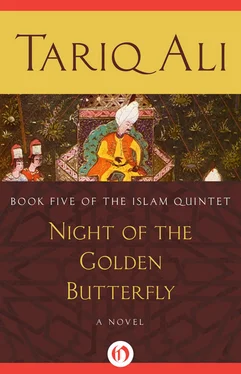I had brought my family album to help Hanif. Each side of the family devoured the photographs of the other. On seeing one of my mother at the age of twenty-four, both of our Vietnamese relations laughed with delight. She was very similar to Thu Van’s grandmother. We compared the two side by side. It was the same family. Of this there could be no doubt. Then they unwrapped a large framed sepia photograph of ‘our honoured matriarch’, in Thong’s words. So this was what Li Wan had looked like. She was old by then. The photograph had been taken in 1898. The location was the Saigon studio of a French photographer, Guillaume Boissier, whose name was prominently stamped on the photograph itself. She was approaching fifty, but the beauty and the authority on her face were only too visible. This was a copy made for us, and I will bring it back with me. I love her face. Sultan Suleiman had met her when she was only eighteen. How lovely she must have looked then, and how mature she must have been to play the role she did at the time. There was nothing like this in our family. We had no photographs of Elder Granny’s mother. My mother said some had been taken by an English photographer in Calcutta, but they had disappeared.
Hanif asked whether there were any other documents, but both women shook their head and Thu Van’s and her mother’s eyes became sad. It emerged that there had been papers, including a manuscript written by the honoured matriarch herself, an account of the Dali sultanate and the uprisings in Yunnan, together with her journey to Cochin China and what she had subsequently achieved. This existed but was owned by the family in California. As I imagined, they had split during the long war in Vietnam. One branch, the one with the archive, had collaborated first with the French and later the Americans. And not just collaborated but provided names of the resistance and betrayed the whereabouts of Thu Van’s uncle a few months before Saigon was liberated in the spring of 1975. The uncle was a leader of the resistance in Cholon, a Saigon suburb. He knew the date of the final assault and a great deal else, but revealed nothing. He was tortured to death.
This concludes the memorandum from Beijing. The postscript below concerns only us.
Postscript
Neelam told me how much she liked you, and that was pleasing. She also said that you and Zahid were bonding again and that she heard you laughing together in the manner of Punjabi schoolboys. Hanif will now, no doubt, become part of all that. Since he must have told you that the big problem in our lives was my lack of passion — this was a regular complaint — let me now confess something to you, and don’t be shocked if it challenges your image of me as Dai-yu, which was also reported by Neelam, who told me she agreed with you. Just to stop you thanking your stars for sparing you an ethereal, spiritual beauty who felt nothing physical and lived in her dreams, let me tell you that I had two lovers at different times in my life. One didn’t last too long and it’s hardly worth mentioning him. The other I enjoyed physically a great deal and also liked as a person, but not enough to break up my family for him. That affair lasted most of the time we were in DC. I trust that you will not impart this information to anyone, neither my husband nor my brother nor either of my children. The secret must die with you, as it will with me.
You’re wondering who this person was, and I will tell you. He was a Tanzanian agronomist I met in the library at Georgetown. We became friends and I learnt a great deal about Africa from him. One day it happened. And, dear friend, were I to describe the heights that my passion reached you would be the one shouting, ‘Hsi-men, Hsi-men.’ The others I can excuse, but you knew that the Dream of the Red Chamber was not the only novel that I had read. You knew that I was busy reading the Chin Ping Mei at a young age. So why am I Dai-yu? Why not Meng Yu-lo or another character like her from Red Chamber ? I often told you that Zahid was a nice man, but I never felt passionately about him. What’s so unusual about that in a marriage? It’s the story of the institution; is it not? He pleasured young nurses. I was pleasured by a middle-aged African professor, but I played the role of Hsi-men. Zahid, as we Chinese-Punjabis say, could see a bee defecating forty miles outside the city, but tripped over an elephant on his own doorstep. I hope you didn’t believe him, but knowing how male camaraderie operates in a Punjabi milieu, I fear you did. You might have discovered the truth for yourself had you not insisted on coffee for breakfast. That opportunity, alas, will never come our way again.
I SENT JINDIÉ AN appreciative e-mail praising her prose to the skies and suggesting a publisher for her musings on Beijing and Yunnan. ‘As for the postscript’, I wrote, ‘I’m delighted to hear you have enjoyed life to the full, though I hope not as fully as Hsi-men Ch’ing, despite your invocation of his name more than once. As for the rest, all I can say is better a middle-aged Tanzanian agronomist than a rapidly aging Punjabi writer who lacks the vigour of youth.’
Zaynab had returned to Fatherland and was asking me each day to set a date so that Plato’s painting could be brought to the house and unveiled. She promised this would not be done till I arrived. Did I think we should invite someone else as well? For Zaynab to ask that meant she already had someone in mind, and even as I was wondering who this could be and from which continent, the phone rang.
‘Alice Stepford here. Is that you, Dara?’
‘Has Zaynab invited you to her country mansion?’
‘Have you decided a date?’
‘Think carefully, Alice. Fatherland is a mess. Americans are not safe there.’
‘Let me know the date, when you’ve decided it, and the flight from London so that we can synchronize watches. Speak soon.’ A frivolous e-mail exchange with Zaynab followed this call:
Good idea to invite a few other people. What about Zahid and Confucius, who were close to him in his Lahore days, as well as Ally Stepford? z.
Will you provide security for the Stepford mistress? D.
You mean your ex-mistress. Why have you gone off her? z.
Could Yu-chih come as well, since she has to be shown Lahore? D.
The party was growing by the minute. Zaynab rang an hour later.
‘Master of the Universe, have you decided on a date?’
‘Mistress of all you survey, what’s the weather like in Sind? Any storms in the offing?’
‘Dara, stop fooling. I’ve got e-mails from all your guests thanking me for the invitation and glad that you invited Mrs Confucius along as well. Ally, my only guest, said you were distinctly harsh and rude to her.’
‘Is there a helicopter service from Karachi Airport to Thanda Gosht Yar, or is it called Sain ville now?’
She suppressed a giggle. ‘Behave. Unless you send me dates by tomorrow morning I’ll unveil it on my own.’
And then one day we all arrived in Karachi. Zaynab’s brother had thoughtfully organized a helicopter, and we were met off the gangway by flunkeys. The Confuciuses had already arrived. The flunkeys took our passports and escorted us to the hotel’s VIP suite.
‘Why not VVIP?’ I asked one of them.
‘Permission only for VIP today, sir.’
‘Was the VVVIP full?’
He tried not to smile.
In the VIP room the Bride of the Koran herself, looking ravishable, greeted us. I had missed her. The sun had done her good; she was a few degrees darker. She embraced Alice with a show of real warmth. Then she gave Zahid a salaam from afar and completely ignored me. I embraced Confucius with genuine delight and was introduced to Yu-chih, so well described by Jindié. Breakfast awaited us. It consisted of tinned and slightly mouldy orange juice, which I warned the others to ignore, but Ally ignored me and downed a tumbler of the foul stuff. An hour later she was looking distinctly peaky. The juice was followed by some deliciously stale chicken sandwiches, withered by the overnight heat and not restored to life by the early morning humidity or being sprinkled with water. One sniff and it was obvious that turpentine had been used as a butter substitute. When I pointed this out, Zaynab collapsed in laughter. She asked if we could have a word alone in the neighbouring prayer room.
Читать дальше












